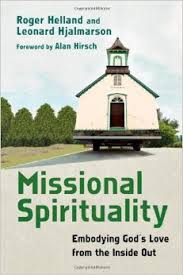If you consider the ways in which Western culture has radically shifted over the past century in regards to politics, economics, media, or technology, you would be sympathetic to anyone complaining of change fatigue. Institutions and individuals have found themselves tumbling in an awkward and painful period of transition.
The Western Church has lagged behind, with a confused identity: what does it mean to lose our traditional authority? As a result, we’ve grasped in the darkness with regards to worship, mission and even theology (think about all the anxiety around gender and sexuality).
In their 2011 book Missional Spirituality: Embodying God’s Love from the Inside Out (IVP), authors Roger Helland and Leonard Hjalmarson describe this cultural context as, “liminality … a threshold, an in-between place of ambiguity and uncertainty, disorientation and transition.”
Liminality does not have to be a threat; on the contrary, we can perceive it as an exciting opportunity. Australian mission and church specialists Michael Frost and Alan Hirsch point to Frodo in The Lord of the Rings as an inspiring example of someone responding to a higher calling and consciously stepping into disorientation. He left the comforts of The Shire, with a high chance of failure, and ventured into the mysterious and dangerous regions of Middle-earth.
But most Western people do not have the Frodo sense of adventure. Most people respond to liminality by trying to create for themselves continuity and success, safeguarding themselves against surprise or loss. Helland and Hjalmarson argue, however, that the secret of the Kingdom of God for Christians is to follow God into danger:
“Only radical commitment to God’s kingdom, as we walk in the ways of Jesus in the power of the Spirit will enable us to welcome newness and surprise as we join God on a mission to reach lost people who also experience liminality.”
In my last post I suggested that too many from our Western Christian context are Religious But Not Spiritual (RBNS). We participate in Christian religious behaviour, hold to a Christian identity, but experience constant spiritual dryness and so look to other contexts for our spiritual nourishment. Perhaps we contribute to our spiritual dryness because, instead of trusting God in the adventure, we opt for middle-class security. Helland and Hjalmarson write,
“The author of Hebrews described Abraham as going-but-not-knowing. And so it is with us. It is difficult to grasp what a mission-shaped spirituality is like while we live in such a security-focused culture. When tomorrow looks the same as today, when our world is stable and predictable, we have little need for faith.”
Let’s face it, churches that try and avoid liminality by safeguarding themselves against loss and being change-resistant, bleed a slow death. Alternatively, churches that are open to God, daily responding to his grace, allowing him to make them more Christlike, by the power of the Holy Spirit, find themselves spiritually alive. Frost and Hirsch write in The Faith of Leap (IVP, 2011):
 “When we embrace liminality – that in-between, discomforting place … and engage it head-on, we discover the truest sense of adventure. In fact … without the adventure we lose the necessary pathos by which we can truly understand the human situation and the meaning of the church.”
“When we embrace liminality – that in-between, discomforting place … and engage it head-on, we discover the truest sense of adventure. In fact … without the adventure we lose the necessary pathos by which we can truly understand the human situation and the meaning of the church.”
I am inviting you to jump off the ten metre high diving board of faith. Join a church plant team, step up into a new and challenging ministry, form friendships with marginalised people, or mentor someone. Take a risk for the Kingdom of God. This will require courage. I know that I have experienced some of my most spiritually enriching times over the past eighteen months while leading the Merri Creek Anglican church plant. I also know, however, that now that it has been eight months since we launched, it would be very easy for us to return to being comfortable Christians.
If you are RBNS, then perhaps you’ve moved too quickly to set up for yourself safety measures against change and loss? Surrender your insecurities to God, and follow him into the unpredictable and messy liminal space. You never know what kind of adventure you might have.